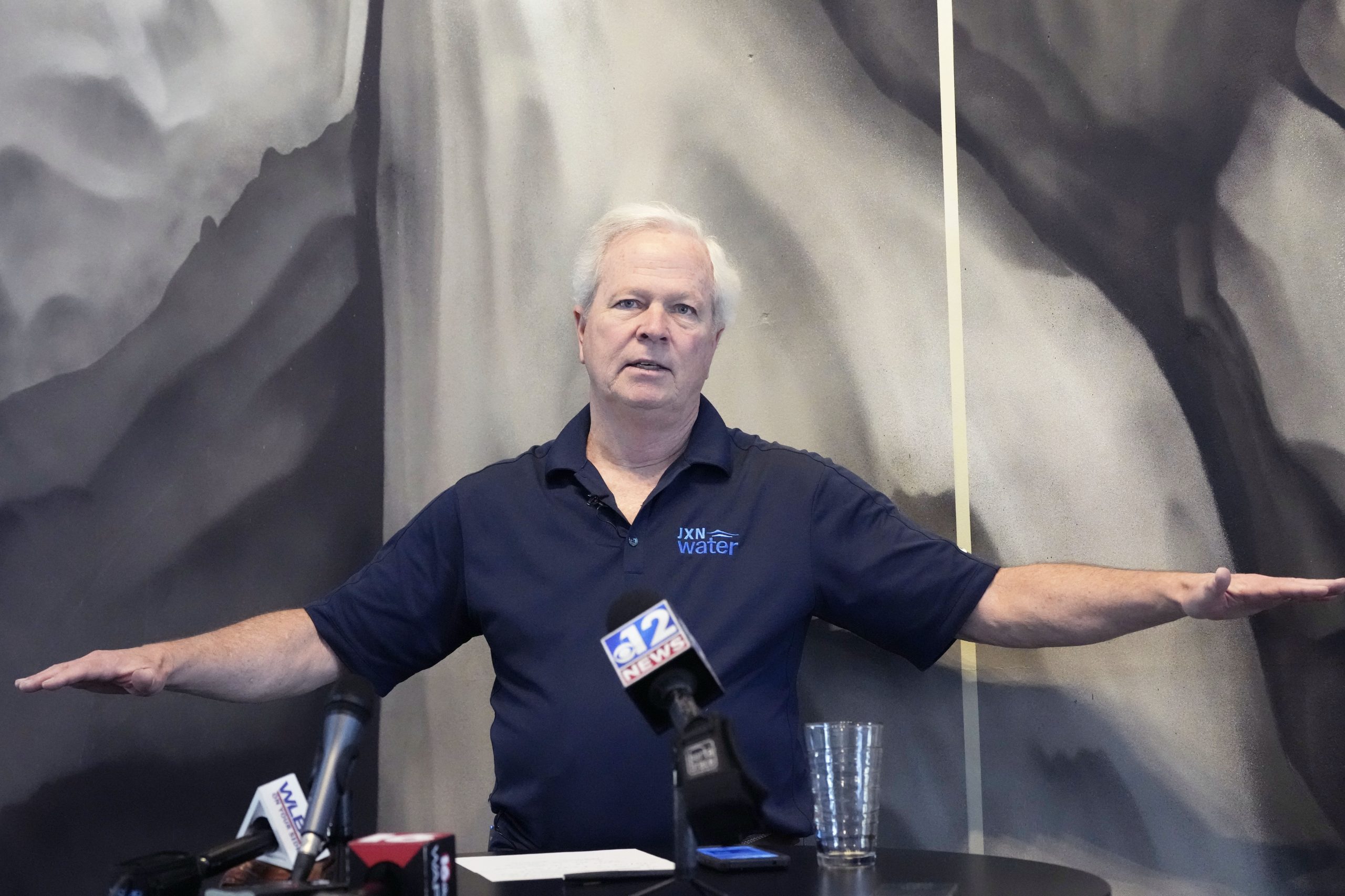Mississippi Today
Jackson sees 12,000 lose water pressure, JXN Water takes aim at misinformation

About 12,000 customers, largely in west and south Jackson, are seeing low to no water pressure after this week’s winter freeze, third-party manager JXN Water reported Thursday morning.
JXN Water subsequently issued boil water notices to those customers in the following areas:
- 39209 – West Jackson along the 49 corridor
- 39204 – West/Central Jackson along 49 corridor to Pearl River and south on east side of 55 between 55 and the Pearl River
- 39212 – South Jackson
- 39272 – South Jackson
- 39170 – South Jackson
Those parts of the city have historically seen the most pressure issues because of their distance from the water treatment facilities, where water enters from the Pearl River and gets sent out for consumption.
Ted Henifin, head of JXN Water, said the demand for water was 40% higher by Wednesday afternoon than on a typical day, and that the plants were “using up pretty much all the margin in our system.” He attributed the issues to pipe breaks in the distribution system, but he also suspected delays with fixing leaks on private properties, which are outside of JXN Water’s authority.
“Last Christmas’ (of 2022) outage, we learned that a lot of private property plumbing that broke wasn’t getting repaired quickly,” Henifin said.
In addition, JXN Water said “deliberate” misinformation in social media posts about the water system’s condition had led to “isolated pressure issues.” The social media posts, JXN Water said in a Wednesday news release, claimed that the city’s water treatment plants would shut down and that residents should prepare by filling up bath tubs and jugs.
The press release claimed that those posts were directly causing an increase in water demand.
Henifin said during a Thursday briefing that JXN Water would share screenshots of the social media posts with the media, but it had yet to do so by this publication.
When asked why he thought it was deliberate, Henifin called the messaging “well crafted” and that it cited JXN Water staff as a source. He also called the timing “suspect” because the system was already under stress.
He added that JXN Water was working with law enforcement agencies to find the original source of the posts and determine if there was any “malicious intent.” JXN Water declined to say which agencies Henifin was referring to.
Overall, compared to the Christmas 2022 event, which led a citywide boil water notice lasting nearly two weeks, Henifin said the weather conditions this week weren’t much different, but that the city has responded better by having 14 crews to make repairs versus just the two the city had in 2022.
“I think our estimation is we would’ve lost the system, probably (Tuesday night) without the crews and without the plants and the condition they’re in today,” he said.
Henifin added that it may take “a day or two” to restore pressure, and asked customers to minimize water use over the next day.
Jackson Public Schools, which closed its schools this week due to icy conditions, announced that it would shift to virtual learning on Thursday because of the pressure issues. Henifin said he recommended that JPS continue virtual learning on Friday, too, because the issues wouldn’t be resolved by then.
The drinking water disruptions, a familiar occurrence for Jacksonians this time of year, come just after the state Mississippi State Department of Health issued a citywide boil water notice after detecting E.coli in the city’s supply. JXN Water disputed the test results, and ultimately the Health Department lifted the notice after just a day. MSDH also issued a notice for Flowood’s water system after finding E.coli, but lifted that one after two days.
This article first appeared on Mississippi Today and is republished here under a Creative Commons license.![]()
Did you miss our previous article…
https://www.biloxinewsevents.com/?p=323947
Mississippi Today
House gives Senate 5 p.m. deadline to come to table, or legislative session ends with no state budget
The House on Wednesday attempted one final time to revive negotiations between it and the Senate over passing a state budget.
Otherwise, the two Republican-led chambers will likely end their session without funding government services for the next fiscal year and potentially jeopardize state agencies.
The House on Wednesday unanimously passed a measure to extend the legislative session and revive budget bills that had died on legislative deadlines last weekend.
House Speaker Jason White said he did not have any prior commitment that the Senate would agree to the proposal, but he wanted to extend one last offer to pass the budget. White, a Republican from West, said if he did not hear from the Senate by 5 p.m. on Wednesday, his chamber would end its regular session.
“The ball is in their court,” White said of the Senate. “Every indication has been that they would not agree to extend the deadlines for purposes of doing the budget. I don’t know why that is. We did it last year, and we’ve done it most years.”
But it did not appear likely Wednesday afternoon that the Senate would comply.
The Mississippi Legislature has not left Jackson without setting at least most of the state budget since 2009, when then Gov. Haley Barbour had to force them back to set one to avoid a government shutdown.
The House measure to extend the session is now before the Senate for consideration. To pass, it would require a two-thirds majority vote of senators. But that might prove impossible. Numerous senators on both sides of the aisle vowed to vote against extending the current session, and Lt. Gov. Delbert Hosemann who oversees the chamber said such an extension likely couldn’t pass.
Senate leadership seemed surprised at the news that the House passed the resolution to negotiate a budget, and several senators earlier on Wednesday made passing references to ending the session without passing a budget.
“We’ll look at it after it passes the full House,” Senate President Pro Tempore Dean Kirby said.
The House and Senate, each having a Republican supermajority, have fought over many issues since the legislative session began early January.
But the battle over a tax overhaul plan, including elimination of the state individual income tax, appeared to cause a major rift. Lawmakers did pass a tax overhaul, which the governor has signed into law, but Senate leaders cried foul over how it passed, with the House seizing on typos in the Senate’s proposal that accidentally resembled the House’s more aggressive elimination plan.
The Senate had urged caution in eliminating the income tax, and had economic growth triggers that would have likely phased in the elimination over many years. But the typos essentially negated the triggers, and the House and governor ran with it.
The two chambers have also recently fought over the budget. White said he communicated directly with Senate leaders that the House would stand firm on not passing a budget late in the session.
But Senate leaders said they had trouble getting the House to meet with them to haggle out the final budget.
On the normally scheduled “conference weekend” with a deadline to agree to a budget last Saturday, the House did not show, taking the weekend off. This angered Hosemann and the Senate. All the budget bills died, requiring a vote to extend the session, or the governor forcing them into a special session.
If the Legislature ends its regular session without adopting a budget, the only option to fund state agencies before their budgets expire on June 30 is for Gov. Tate Reeves to call lawmakers back into a special session later.
“There really isn’t any other option (than the governor calling a special session),” Lt. Gov. Delbert Hosemann previously said.
If Reeves calls a special session, he gets to set the Legislature’s agenda. A special session call gives an otherwise constitutionally weak Mississippi governor more power over the Legislature.
This article first appeared on Mississippi Today and is republished here under a Creative Commons license.
Mississippi Today
Candice Wilder joins Mississippi Today as new higher education reporter
Mississippi Today is pleased to announce that Candice Wilder has joined the newsroom as our newest higher education reporter.
Wilder takes over higher ed coverage from Mississippi Today reporter Molly Minta, who built the beat starting in early 2021 but has since moved to the newsroom’s team covering the city of Jackson.
“I’m thrilled to join a talented and ambitious team of journalists who provide critical news and information to Mississippians,” Wilder said. “Reporting on the state’s colleges and universities at this moment is more important now than ever. My goal is to develop thoughtful coverage and tell crucial stories that will continue to serve and reflect these communities.
Wilder, an Ohio native, was one of 19 founding staff members of Signal Cleveland, an inaugural nonprofit newsroom part of Signal Ohio. There, she developed a beat that provided accessible health news and information to residents of Cleveland. Her work has led to recognitions from the Cleveland Press Club and the Association of Healthcare Journalists.
“We couldn’t be more excited to welcome Candice to our newsroom,” said Adam Ganucheau, Mississippi Today’s editor-in-chief. “So many aspects of the higher education system are under intense scrutiny and attack across the country — from free speech to funding to accountability — and Mississippi is certainly no exception. Our colleges and universities are at the heart of critical conversations about equity, access, and the future of our state as a whole. Candice brings a sharp eye, strong reporting skills, and genuine curiosity to our team, and I’m confident that her work will help Mississippians navigate the often complicated and evolving nature of higher ed here.”
“We’re so happy to have someone with Candice Wilder’s passion and experience to pick up the mantle of higher education reporting at Mississippi Today,” said Debbie Skipper, who will serve as her editor. “Molly Minta set a high standard in our reporting in this area, and I know Candice will maintain that while offering her own professional perspective.”
This article first appeared on Mississippi Today and is republished here under a Creative Commons license.![]()
Mississippi Today
PSC revives solar programs a year after suspending them
The Mississippi Public Service Commission voted unanimously on Tuesday to lift a stay on programs offering incentives for solar power. The same commission voted to suspend the programs last April.
The PSC initially voted in 2024 to suspend three programs: “Solar for Schools,” which allows school districts to essentially build solar panels for free in exchange for tax credits, as well as incentives for battery storage and low-income participants in the state’s “distributed generation” rule. Mississippi’s “distributed generation” rule is similar to net metering in other places, but reimburses customers for less than what most states offer.
Net metering is a program where power companies — in this case Entergy Mississippi and Mississippi Power — reimburse customers who generate their own solar power, often with rooftop panels, and sell any extra power back to the grid.
The PSC suspended the programs in 2024 because, at the time, the federal government was also offering funds through its “Solar for All” initiative. The commission reasoned that the state didn’t need to add incentives, which the previous commission approved in 2022 on top of the new funding. After learning that the state government didn’t receive any “Solar for All” funding, the PSC decided on Tuesday to reverse course.
While the State of Mississippi didn’t receive any of the funding, Hope Enterprise Corp. did get $94 million last year through the program to bring solar power to low-income and disadvantaged homes in the state.
The previous PSC created the “Solar for Schools” program as a way to save school districts money on their power bills to help with other expenses. While no districts were able to make use of the program before the PSC suspended it last year, other districts have seen savings after installing solar panels. Any of the 95 school districts within the Entergy and Mississippi Power grids are eligible for the PSC incentives.
Solar advocates disagreed with the PSC’s assertion that federal “Solar for All” funding would have replaced the PSC programs, which went into effect in January 2023, arguing that the commission’s ruling would scare off potential new business. Those advocates applauded Tuesday’s reversal, saying the incentives will support professions within the solar supply chain such as electricians, roofers, manufacturers and installers.
“Yesterday’s actions by the MPSC sends a strong signal that Mississippi is open for business,” Monika Gerhart, executive director of the Gulf States Renewable Energy Industries Association, said via email. “For schools and homeowners that want to save money on their light bill, yesterday’s vote creates additional savings to install solar.”
This article first appeared on Mississippi Today and is republished here under a Creative Commons license.![]()
-

 Mississippi Today19 hours ago
Mississippi Today19 hours agoPharmacy benefit manager reform likely dead
-

 News from the South - Alabama News Feed6 days ago
News from the South - Alabama News Feed6 days agoSevere storms will impact Alabama this weekend. Damaging winds, hail, and a tornado threat are al…
-

 News from the South - Alabama News Feed5 days ago
News from the South - Alabama News Feed5 days agoUniversity of Alabama student detained by ICE moved to Louisiana
-

 News from the South - Louisiana News Feed7 days ago
News from the South - Louisiana News Feed7 days agoSeafood testers find Shreveport restaurants deceiving customers with foreign shrimp
-

 News from the South - Oklahoma News Feed4 days ago
News from the South - Oklahoma News Feed4 days agoTornado watch, severe thunderstorm warnings issued for Oklahoma
-

 News from the South - West Virginia News Feed7 days ago
News from the South - West Virginia News Feed7 days agoRoane County Schools installing security film on windows to protect students
-

 News from the South - Virginia News Feed5 days ago
News from the South - Virginia News Feed5 days agoYoungkin removes Ellis, appoints Cuccinelli to UVa board | Virginia
-

 News from the South - Florida News Feed6 days ago
News from the South - Florida News Feed6 days agoPeanut farmer wants Florida water agency to swap forest land














































